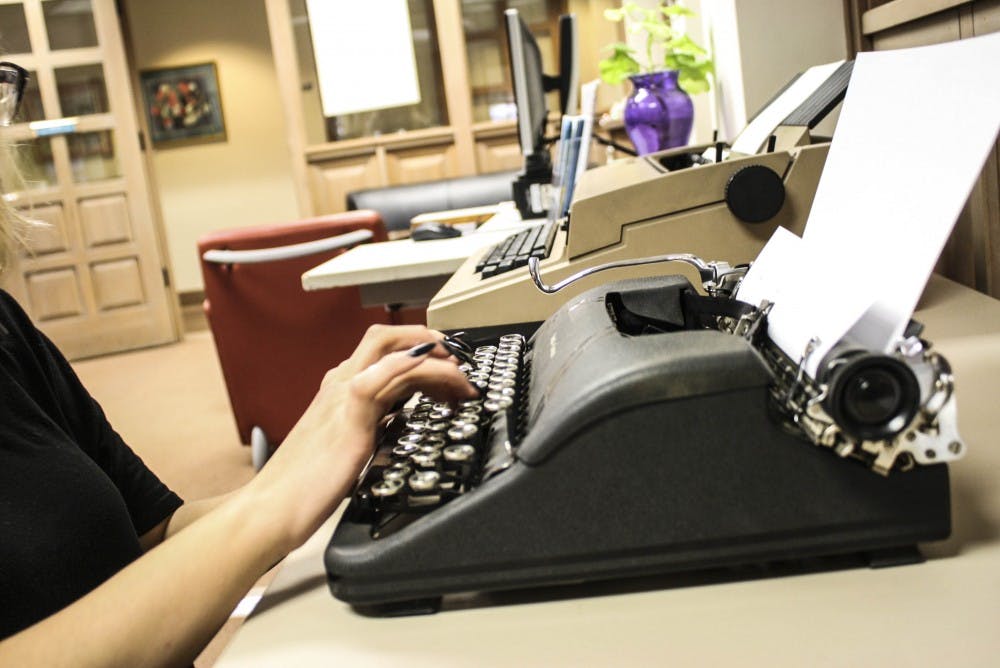If you like to write poetry, nonfiction essays or short fiction and plays, then the Indigenous Nations Library Program has a challenge that’s just for you.
The program is hosting the Typewriter Challenge: Indigenous Writing, a competition for writers to submit their work, as long as it was written on a typewriter.
Kevin Brown, the program specialist for the Indigenous Nations Library Program, said that the program gives students writing and research support. The idea for the Typewriter Challenge came to him when students asked him for writing advice.
“One of the best ways to (improve your writing), I think, is limiting yourself through technology,” Brown said. “I thought maybe we take an old-school approach to writing. A lot of students are comfortable with their laptops, their phones and their computers, and they’re comfortable with grammar checks and spell checks, and I would say they’ve learned their writing style based on that technology.”
Brown chose the typewriter specifically for this challenge, because it forces the user to think about what they write before they write it and to mind their formatting and their grammar, he said.
Brown called typewriters “nostalgic,” saying the machine gives “a sense of pause in writing, pausing between your ideas in your head and actually writing it, taking careful consideration of what you’re about to say. A typewriter is not forgiving in that if you make mistake, you miss a period, you miss a key strike, you miss your margins, your alignments, you have to start all over, especially if you want to submit it to something professional or edited, and you have to be patient with that. So it’s more of that process of writing, being more patient, and being mindful of your writing.”
Brown noticed a lot students getting so frustrated with having to re-do their work that they gave up, he said. The students work on the typewriters at the Indigenous Nations Library Program on the second floor of Zimmerman Library.
For people interested in participating in the challenge, the program provides five different typewriters to choose from: two mechanical typewriters, one from the 40s, one from the 60s, and one electrical typewriter from the 80s.
“I prefer the mechanical, because there’s something romantic about it,” Brown said. “It’s very beautiful, and it works. After all these years, decades, it still works beautifully. I wonder about the stories written on them too.”
Students can write about anything for the challenge, but suggested writing prompts are available for those who need a springboard for their writing, he said.
“Since we’re an Indigenous-focused program, we asked them, what is their current state of Indigenous worldview right now, and if they had recommendations to change, what would it be?” Brown said.
Other prompts included questions about a conversation with an ancestor and advice for Indigenous students.
Get content from The Daily Lobo delivered to your inbox
“We stuck to Indigenous themes, but I think next time we’ll just have it broader in general so anybody can enter,” Brown said.
After the submissions are judged, they are blindly reviewed through the use of a rubric by three judges, representing CAPS, the English Department and the University Libraries.
The participants get feedback for their submissions on their grammar, writing style and other writing decisions, according to Brown.
Each participant can submit only one entry. For nonfiction, the work must be 500 to 1,000 words total. For poetry, the work must be 500 words or less.
“Another part of the writing process is writing succinctly and writing with purpose, so that’s the reason for the word limit,” Brown said. “It challenges the writer to write about things that they thought through thoroughly. I think it’s a sign of an excellent writer, writing small.”
“The biggest skillset that any student needs to learn is how to write effectively and efficiently in a concise manner but also have that passion behind it,” Brown added.
He also said students’ writing changes and grows with each new semester because of the classes they take. They learn different formats, like APA, MLA or AP. Using a typewriter can help students address formatting directly, because they have to manually set up their format.
“One thing you should ask yourselves is, do I want to be a better communicator?” Brown said. “That’s what I have basically suggested to the students who have asked questions about the challenge. I put it back in their hands. Do you want to test yourself in other areas of communication devices other than a computer or a laptop, or even your phone? Do you want to understand how you can control the style of your paper?”
The submissions are due in hard copy form on Friday, Dec. 1, at 5 p.m. at the Indigenous Nations Library Program. The submissions will be published in either the Indigenous Nations Library Program’s monthly newsletter or the UNM Libraries’ digital repository, Brown said.
Ariel Lutnesky is a culture reporter for the Daily Lobo. She can be contacted at culture@dailylobo.com or on Twitter @ArielLutnesky.






